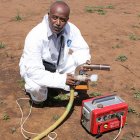Maina Waruru : 24 February 2012
 Flickr/CIMMYT
Flickr/CIMMYT
The world needs more experts to tackle environmental challenges
The world is facing a major shortage of experts capable of tackling sustainable development challenges that could undermine efforts to achieve a green economy, a top-level advisory panel to the UN Environment Programme (UNEP) warned this week.
It said that this shortage needed to be addressed both through training and the upgrading of existing expertise.
The report was launched at UNEP's 12th special session of its governing council in Nairobi, Kenya, this week (20–22 February).
They presented a list of key environmental concerns, and then asked more than 400 leading environmental scientists from around the world to rank the list in order of importance.
The report aims to provide governments, civil society and businesses with scientific assessments to help them forge an agreement at the UN Conference on Sustainable Development (Rio+20) in Brazil in June.
According to UNEP chief scientist, Joseph Alcamo, there is a wide skills gap in many priority areas, including renewable energy, ecosystem services, food safety and security, and water.
The report put this lack of skills as the second most important challenge.
However, the issue rated most important was environmental governance.
The system of international global governance that emerged in the 20th century and is largely unsuitable for addressing this century's challenges, the report says.
It called for governance to be better aligned with global sustainability challenges, and said that the effectiveness of emerging, novel governance structures will need further scrutiny for this to happen.
Scientists said at this week's meeting that food security, which ranked third on their priority list, must be handled from an ecological perspective — and not merely a political and socioeconomic perspective, if sustainability was to be achieved.
Food production systems in many developing countries remain under a severe ecological threat, with agriculture and fisheries ecosystems coming under severe pressure, from poor ecological management.
The other top issues in the report of the Foresight Panel included reconnecting science and policy; accelerating the implementation of environmentally-friendly renewable; integrating biodiversity across the environmental and economic agendas; new challenges for climate change mitigation and adaptation; and the need for a new approach for minimizing risks of novel technologies and chemicals.
http://www.scidev.net/en/science-and-innovation-policy/capacity-building/news/boost-expertise-to-achieve-green-economy-says-unep-1.html
 Flickr/CIMMYT
Flickr/CIMMYTThe world needs more experts to tackle environmental challenges
The world is facing a major shortage of experts capable of tackling sustainable development challenges that could undermine efforts to achieve a green economy, a top-level advisory panel to the UN Environment Programme (UNEP) warned this week.
It said that this shortage needed to be addressed both through training and the upgrading of existing expertise.
The report was launched at UNEP's 12th special session of its governing council in Nairobi, Kenya, this week (20–22 February).
They presented a list of key environmental concerns, and then asked more than 400 leading environmental scientists from around the world to rank the list in order of importance.
The report aims to provide governments, civil society and businesses with scientific assessments to help them forge an agreement at the UN Conference on Sustainable Development (Rio+20) in Brazil in June.
According to UNEP chief scientist, Joseph Alcamo, there is a wide skills gap in many priority areas, including renewable energy, ecosystem services, food safety and security, and water.
The report put this lack of skills as the second most important challenge.
However, the issue rated most important was environmental governance.
The system of international global governance that emerged in the 20th century and is largely unsuitable for addressing this century's challenges, the report says.
It called for governance to be better aligned with global sustainability challenges, and said that the effectiveness of emerging, novel governance structures will need further scrutiny for this to happen.
Scientists said at this week's meeting that food security, which ranked third on their priority list, must be handled from an ecological perspective — and not merely a political and socioeconomic perspective, if sustainability was to be achieved.
Food production systems in many developing countries remain under a severe ecological threat, with agriculture and fisheries ecosystems coming under severe pressure, from poor ecological management.
The other top issues in the report of the Foresight Panel included reconnecting science and policy; accelerating the implementation of environmentally-friendly renewable; integrating biodiversity across the environmental and economic agendas; new challenges for climate change mitigation and adaptation; and the need for a new approach for minimizing risks of novel technologies and chemicals.
http://www.scidev.net/en/science-and-innovation-policy/capacity-building/news/boost-expertise-to-achieve-green-economy-says-unep-1.html











No comments:
Post a Comment